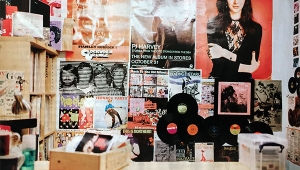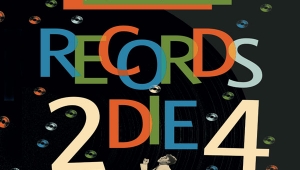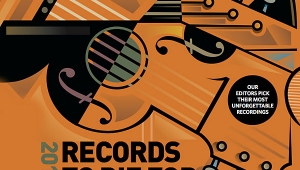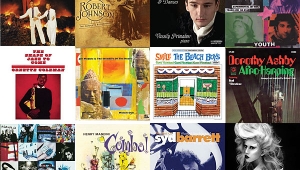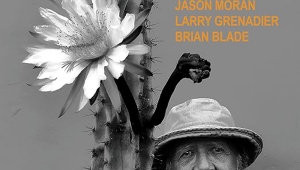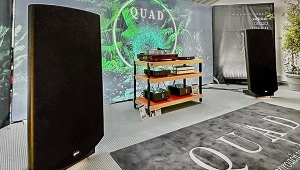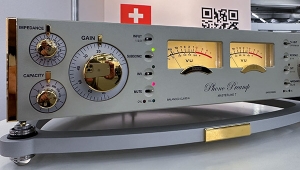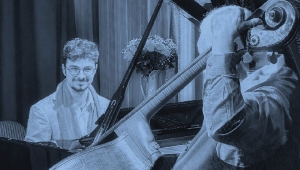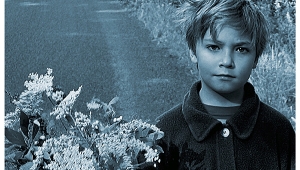| Columns Retired Columns & Blogs |
1998 Records To Die For Page 11
David Sokol
BILL LLOYD: Set to Pop
East Side Digital ESD 80892 (CD). 1994. Bill Lloyd, prod.; Byron House, Scott Baggett, Tim Coats, John Hampton, Rick Will, engs. AAD? TT: 59:52
Not only is this pure-pop confection a record to die for, it's one that saved my life. When the winter weather got hazardous, as it often did during my daily commute between Massachusetts and New Hampshire, it was Nashvillian Bill Lloyd's '60s-meet-'90s melodies, lyrical humor, and warm Anglo-American vibe that kept me focused on the road despite white-outs and sleet. Set to Pop is in that stratospheric big league with Zuma, Pet Sounds, Revolver, and I'm With Stupid. But if I could choose just one, it would be Lloyd's flawless, captivatingly catchy, slightly twisted, and always inviting work of brilliance. Hit the Random button and glow.
BOB DYLAN: Blonde on Blonde
Columbia CGK 841 (CD). 1966, 1982. Bob Johnston, prod. AAD? TT: 73:16
Thirty-plus years and incalculable listenings later, Dylan's most ambitious session remains his most enduring. I still discover a new lyrical twist or nuance of phrasing every time I hear "Stuck Inside of Mobile with the Memphis Blues Again," "Sad Eyed Lady of the Lowlands," or, for that matter, most of the 14 songs here. Recorded in Nashville, this is hardly a country record, though there's an edgy rootsiness to the playing and a depth to the mood, the poetry, and the vocals that defy time while transporting, even hypnotizing this listener back to a very different one. Folk and blues, tender ballads, and raunchy rockers meld seamlessly, making every spin of this work of genius as thrilling as the first.

David Patrick Stearns
BEETHOVEN: Violin & Piano Sonatas, Op.24 ("Spring") & Op.47 ("Kreutzer")
Manoug Parikian, violin; Magda Tagliaferro, piano
Musical Masterpiece Society (LP only). 1995. AAA. No prods or engs listed. No time listed.
Posterity can be amazingly illogical. Though Brazilian-born, Paris-trained pianist Magda Tagliaferro died honored, loved, and decorated in 1987 at age 94, she doesn't even rate an entry in the New Grove Dictionary of Music. Her recordings have come out on CD fitfully, mostly in Philips' 1994 three-CD retrospective. This year, however, I came upon a second-hand LP that ranks among my greatest chamber-music experiences. Though I know next to nothing about violinist Parikian (who is excellent), Tagliaferro is an ideal partner, brimming with ideas that make the theme-and-variations movement of the "Kreutzer" so eventful as to be epic. Effortlessly, she funnels all of this, plus a steely intensity, into a rich sound that never threatens to cover the violinist. Moreover, there's a buoyancy that gives the performance a sense of fun.
SIBELIUS: Symphony 7, Kullervo
Hilevi Martinpelto, soprano; Karl-Magnus Frederiksson, baritone; Sir Colin Davis, London Symphony Orchestra & Chorus
RCA 68132-2 (2 CDs). 1997. Mike Brenmer, prod.; Tony Faulkner, eng. DDD. TT: 100:00.
Over the past few years, London concert critics have been comparing Colin Davis' latest encounters with Sibelius' symphonies to the events of legend, such as Wilhelm Furtwängler's Beethoven. The RCA recordings that have come out of these encounters haven't always met with that kind of acclaim, but this latest installment ought to. The 20-minute Symphony 7 is highly concentrated and abstract, though Davis' fluid, elastic tempos give it a sense of physical movement that draws you deep inside this often forbidding work. Within these highly complex chord structures, Davis demonstrates an unerring ability to underscore the one voice that makes everything fall into place. The coupling is Kullervo, the composer's early, ambitious 80-minute choral symphony. It receives a performance nearly as revolutionary, one that minimizes its orchestral crudity and thus keeps the piece from seeming immature. Sound quality is excellent.

Chip Stern
JULIUS HEMPHILL SEXTET: Fat Man and the Hard Blues
Julius Hemphill, alto sax, composer-arranger; Marty Ehrlich, soprano & alto sax, flute; Carl Grubbs, soprano & alto sax; James Carter, Andrew White, tenor sax; Sam Furnace, baritone sax
Black Saint 120115-1/2 (LP/CD). 1991. Alvin Speights, Leslie Braithwaite, George Catfish Pappas, engs. AAA/AAD? TT: 55:17
This great 20th-century orchestrator and improviser valued honesty and originality of expression above all else, and from Hemphill's groundbreaking synthesis of modern jazz, Afro-trance, and rural blues on Dogon A.D., to the giddy polyglot of poetry and orchestral writing on Big Band, the boldness of his writing for dance, theater, multimedia presentations, and jazz ensemble marks him as an innovator of the highest order.
JOI: The Pendulum Vibe
Joi Gilliam, vocals, vocal arrangements; Dallas Austin, bass, drums, keyboards; others
EMI 27762 2 (2 CDs). 1994. Dallas Austin, prod.; Alvin Speights, Leslie Braithwaite, George Catfish Pappas, engs. AAD? TT: 2:34:38
"We will not bow down..." announces the keening solo voice, as an a cappella chorus "Amen"s. Suddenly the airy acoustic mood gives way to the electronic distortion of a thundering rhythm track as a rapper chants "It's a beat-box Jesus" over an insistent low-end roar; a swelter of narrators vies for attention as a gospel chorus and the protagonist's brassy blues shouts cut through the sonic murk of radio interference with cries of "Freedom!" It's as if past, present, and future are commingling in one moment.
ART TATUM: The Tatum Group Masterpieces
Art Tatum, piano; Ben Webster, tenor sax; Red Callender, bass; Bill Douglass, drums
Pablo/JVC XRCD JVCXR-0034-2 (CD). 1956. Norman Granz, original prod.; Akira Taguchi, prod.; Val Valetin, original eng.; Alan Yoshida, mastering. AAD. TT: 57:17
I bought this album as an LP over 30 years ago, marveling then at the soft sweetness of the recording, its unrushed, reflective quality. It's still great, but even better in JVC's superb remastering. Webster's breath-at-the-edges tone emanates like a grand cloud. The tenorman's wondrous phrasing, his magical way of wending from one melody note to the next, is delightful, as are his improvisations on "All the Things You Are," "Gone With the Wind," and other tunes that often contain juicy modern thoughts. Tatum is on fire here, dropping mad, delicious double-times into the somber tempos---the height of embellishment. Man, could that guy swing. (XX-12)
DIZZY GILLESPIE/SONNY ROLLINS/SONNY STITT: Sonny Side Up
Dizzy Gillespie, trumpet; Sonny Rollins, Sonny Stitt, tenor sax; Ray Bryant, piano; Tommy Bryant, bass; Charlie Persip, drums
Verve 314 521 462-2 (CD). 1957. Norman Granz, original prod.; Michael Lang, Richard Seidel, prods.; Ben Young, restoration; Suha Gur, mastering. AAD. TT: 37:48
Buy this album for the chilling set of tenor chases that Rollins and Stitt deliver midway into the galloping "Eternal Triangle." Here, two masters throw the long, furled lines, choppy bluesy bits and more back and forth at each other. The result: jazz excitement at its zenith. Toss in ace solos from the tenorists (and Dizzy, too, on this cut), the crackling slow blues of "After Hours," Rollins' brilliant stop choruses on "I Know That You Know," and Dizzy's raspy vocal on "Sunny Side of the Street," and you have a timeless recording.

BILL LLOYD: Set to Pop
East Side Digital ESD 80892 (CD). 1994. Bill Lloyd, prod.; Byron House, Scott Baggett, Tim Coats, John Hampton, Rick Will, engs. AAD? TT: 59:52
Not only is this pure-pop confection a record to die for, it's one that saved my life. When the winter weather got hazardous, as it often did during my daily commute between Massachusetts and New Hampshire, it was Nashvillian Bill Lloyd's '60s-meet-'90s melodies, lyrical humor, and warm Anglo-American vibe that kept me focused on the road despite white-outs and sleet. Set to Pop is in that stratospheric big league with Zuma, Pet Sounds, Revolver, and I'm With Stupid. But if I could choose just one, it would be Lloyd's flawless, captivatingly catchy, slightly twisted, and always inviting work of brilliance. Hit the Random button and glow.
BOB DYLAN: Blonde on Blonde
Columbia CGK 841 (CD). 1966, 1982. Bob Johnston, prod. AAD? TT: 73:16
Thirty-plus years and incalculable listenings later, Dylan's most ambitious session remains his most enduring. I still discover a new lyrical twist or nuance of phrasing every time I hear "Stuck Inside of Mobile with the Memphis Blues Again," "Sad Eyed Lady of the Lowlands," or, for that matter, most of the 14 songs here. Recorded in Nashville, this is hardly a country record, though there's an edgy rootsiness to the playing and a depth to the mood, the poetry, and the vocals that defy time while transporting, even hypnotizing this listener back to a very different one. Folk and blues, tender ballads, and raunchy rockers meld seamlessly, making every spin of this work of genius as thrilling as the first.
David Patrick Stearns
BEETHOVEN: Violin & Piano Sonatas, Op.24 ("Spring") & Op.47 ("Kreutzer")
Manoug Parikian, violin; Magda Tagliaferro, piano
Musical Masterpiece Society (LP only). 1995. AAA. No prods or engs listed. No time listed.
Posterity can be amazingly illogical. Though Brazilian-born, Paris-trained pianist Magda Tagliaferro died honored, loved, and decorated in 1987 at age 94, she doesn't even rate an entry in the New Grove Dictionary of Music. Her recordings have come out on CD fitfully, mostly in Philips' 1994 three-CD retrospective. This year, however, I came upon a second-hand LP that ranks among my greatest chamber-music experiences. Though I know next to nothing about violinist Parikian (who is excellent), Tagliaferro is an ideal partner, brimming with ideas that make the theme-and-variations movement of the "Kreutzer" so eventful as to be epic. Effortlessly, she funnels all of this, plus a steely intensity, into a rich sound that never threatens to cover the violinist. Moreover, there's a buoyancy that gives the performance a sense of fun.
SIBELIUS: Symphony 7, Kullervo
Hilevi Martinpelto, soprano; Karl-Magnus Frederiksson, baritone; Sir Colin Davis, London Symphony Orchestra & Chorus
RCA 68132-2 (2 CDs). 1997. Mike Brenmer, prod.; Tony Faulkner, eng. DDD. TT: 100:00.
Over the past few years, London concert critics have been comparing Colin Davis' latest encounters with Sibelius' symphonies to the events of legend, such as Wilhelm Furtwängler's Beethoven. The RCA recordings that have come out of these encounters haven't always met with that kind of acclaim, but this latest installment ought to. The 20-minute Symphony 7 is highly concentrated and abstract, though Davis' fluid, elastic tempos give it a sense of physical movement that draws you deep inside this often forbidding work. Within these highly complex chord structures, Davis demonstrates an unerring ability to underscore the one voice that makes everything fall into place. The coupling is Kullervo, the composer's early, ambitious 80-minute choral symphony. It receives a performance nearly as revolutionary, one that minimizes its orchestral crudity and thus keeps the piece from seeming immature. Sound quality is excellent.
Chip Stern
JULIUS HEMPHILL SEXTET: Fat Man and the Hard Blues
Julius Hemphill, alto sax, composer-arranger; Marty Ehrlich, soprano & alto sax, flute; Carl Grubbs, soprano & alto sax; James Carter, Andrew White, tenor sax; Sam Furnace, baritone sax
Black Saint 120115-1/2 (LP/CD). 1991. Alvin Speights, Leslie Braithwaite, George Catfish Pappas, engs. AAA/AAD? TT: 55:17
This great 20th-century orchestrator and improviser valued honesty and originality of expression above all else, and from Hemphill's groundbreaking synthesis of modern jazz, Afro-trance, and rural blues on Dogon A.D., to the giddy polyglot of poetry and orchestral writing on Big Band, the boldness of his writing for dance, theater, multimedia presentations, and jazz ensemble marks him as an innovator of the highest order.
The depth and range of his tonal palette for a saxophone sextet on Fat Man and the Hard Blues is even richer and more imposing than his finest work with the World Saxophone Quartet. The voice leadings on "Opening" and "Tendrils" suggest the work of a composer versed in the 20th-century harmonic practices of an Elliot Carter, even as his main themes, contrasting harmonies, and curlicuing syncopations on "Floppy" expand on the swinging Kansas City/Southwest tradition of Bird and Ornette, and showcase Hemphill's thrilling, guitarlike phrasings on alto sax.
The depth of soundstage and visceral impact of the recording is more than equal to the collective vigor of the ensemble (and its great soloists Andrew White, James Carter, and Marty Ehrlich), particularly on "Fat Man" and "The Hard Blues," where Hemphill builds layer upon layer of contrasting vamps and riffs, expanding upon elemental funk and blues materials until the grooves blossom into heated polytonal convocations. Fat Man & The Hard Blues is a post-modern masterpiece.
JOI: The Pendulum Vibe
Joi Gilliam, vocals, vocal arrangements; Dallas Austin, bass, drums, keyboards; others
EMI 27762 2 (2 CDs). 1994. Dallas Austin, prod.; Alvin Speights, Leslie Braithwaite, George Catfish Pappas, engs. AAD? TT: 2:34:38
"We will not bow down..." announces the keening solo voice, as an a cappella chorus "Amen"s. Suddenly the airy acoustic mood gives way to the electronic distortion of a thundering rhythm track as a rapper chants "It's a beat-box Jesus" over an insistent low-end roar; a swelter of narrators vies for attention as a gospel chorus and the protagonist's brassy blues shouts cut through the sonic murk of radio interference with cries of "Freedom!" It's as if past, present, and future are commingling in one moment.
So begins this unheralded R&B concept album by vocal diva Joi, one of the finest natural voices to emerge since Aretha first demanded r-e-s-p-e-c-t. With each successive track, producer Dallas Austin peels away another layer of electronic illusion and artifice until voice and instruments are depicted with near-acoustic veracity, as this remarkably versatile vocalist enlivens a series of inspired arrangements about the end of a relationship and the onset of higher consciousness. Moving easily from urban feminist anthems ("Sunshine & the Rain," "Find Me") through sweet jazz-soul ballads ("Memories," "Fatal Lovesick Journey") with a classical stopover in church ("Adoramus Te Christie"), to catty tales of eroticism ("Narcissa Cutie Pie") and the raga-rock resignation and acceptance of "I Don't Mind," Joi comes full circle, concluding with a serene spiritual worthy of Sweet Honey in the Rock, and a conclusive reprise of "Freedom."
This recording has massive low end, and is shot through with loads of aural details. Joi manages to cover half a dozen vocal styles with character, charisma, conviction, and nary a sniff of bathos or whiny ho-ho-ho vibrato, evoking everyone from Dinah Washington and Minnie Ripperton to Marian Anderson and Aretha. And between them, Joi and Austin share an encyclopedic breadth of musical influence worthy of TAFKAP. The Pendulum Vibe is as visionary an R&B record as I've heard in the past 25 years. ![]()
Zan Stewart
ART TATUM: The Tatum Group Masterpieces
Art Tatum, piano; Ben Webster, tenor sax; Red Callender, bass; Bill Douglass, drums
Pablo/JVC XRCD JVCXR-0034-2 (CD). 1956. Norman Granz, original prod.; Akira Taguchi, prod.; Val Valetin, original eng.; Alan Yoshida, mastering. AAD. TT: 57:17
I bought this album as an LP over 30 years ago, marveling then at the soft sweetness of the recording, its unrushed, reflective quality. It's still great, but even better in JVC's superb remastering. Webster's breath-at-the-edges tone emanates like a grand cloud. The tenorman's wondrous phrasing, his magical way of wending from one melody note to the next, is delightful, as are his improvisations on "All the Things You Are," "Gone With the Wind," and other tunes that often contain juicy modern thoughts. Tatum is on fire here, dropping mad, delicious double-times into the somber tempos---the height of embellishment. Man, could that guy swing. (XX-12)
DIZZY GILLESPIE/SONNY ROLLINS/SONNY STITT: Sonny Side Up
Dizzy Gillespie, trumpet; Sonny Rollins, Sonny Stitt, tenor sax; Ray Bryant, piano; Tommy Bryant, bass; Charlie Persip, drums
Verve 314 521 462-2 (CD). 1957. Norman Granz, original prod.; Michael Lang, Richard Seidel, prods.; Ben Young, restoration; Suha Gur, mastering. AAD. TT: 37:48
Buy this album for the chilling set of tenor chases that Rollins and Stitt deliver midway into the galloping "Eternal Triangle." Here, two masters throw the long, furled lines, choppy bluesy bits and more back and forth at each other. The result: jazz excitement at its zenith. Toss in ace solos from the tenorists (and Dizzy, too, on this cut), the crackling slow blues of "After Hours," Rollins' brilliant stop choruses on "I Know That You Know," and Dizzy's raspy vocal on "Sunny Side of the Street," and you have a timeless recording.
- Log in or register to post comments






